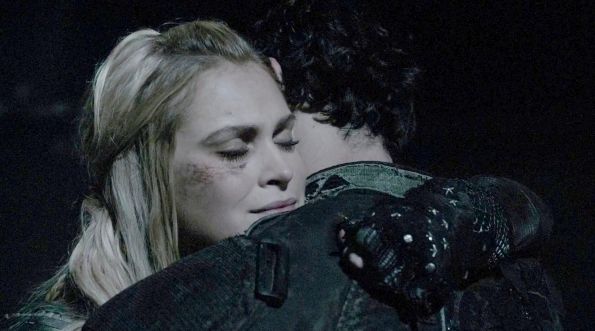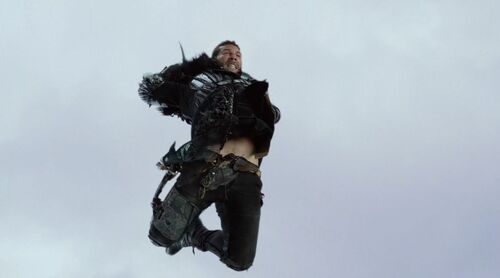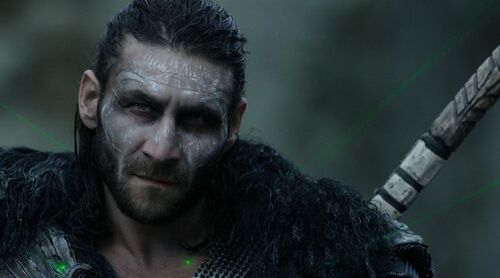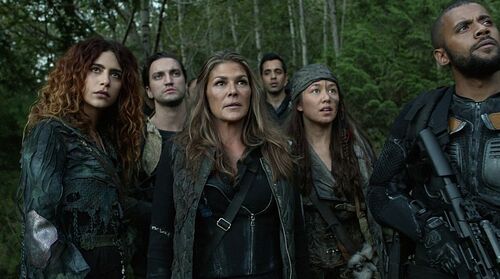
The 100 S3E10: "Join or Die" Review
 Join or Die continues to pack in the thematic material as the season hurtles towards the finale, but unfortunately, falls back into some bad habits from the first half.
Join or Die continues to pack in the thematic material as the season hurtles towards the finale, but unfortunately, falls back into some bad habits from the first half.
The easiest way to go through this episode, which is so rife with character development from before the pilot to the current canon, is by character. This was mainly an episode that explored this season's themes while setting the stage for the finale, but because it's so dense I broke it down by character. The review and criticism is at the end.
JAHA/ALIE AND FALSE UNITY
What Join or Die accomplishes is a complicated view on what, exactly, is meant by the concept of unity. Unity was a formative principle of life on the Ark—in the first season, Unity Day gave us a brief history of the Ark which was further expanded upon in Thirteen this season. The Ark was formed of twelve space stations, the thirteenth being shot out of the sky for not ‘unifying’ fast enough, and as a lesson to the other space stations. That kind of coercive, oppressive unity is terrifying. The Ark survived for 97 years as a high stratified, totalitarian state. Unified in purpose of keeping everyone alive, by executing for even the smallest infractions and sending their children down to Earth for almost-certain death.
The flashback scenes offers us insight into Ark life. One is to again offer comparison/contrast with Grounder life, but more importantly, Polis under the thrall of the City of Light. In making that connection, the show is actively dismantling the idea that we should view the Arkers/Sky People as unproblematic heroes. The story may be told from their point of view, but they come from a society that is violent, unforgiving, and unjust, just like the Grounders. Each society is unyielding to the other, because by its very foundations it can’t yield. Both are built on the concepts of survival no matter the cost. Even if it means revenge for every action. Even if it means sending your children to almost-certain death. So how do you unify two such cultures?
One way is unity built on conformity and false promises. It’s a unity that seeks to make you feel good, but also dehumanizes you. It’s seductive, but also frail, because it desires to redefine the human experience into something it’s not. That is the City of Light. That is the false salvation that Jaha and ALIE offer to the people on the Ground.
But it sounds good. It feels good. To traumatized people, constantly at war with each other, with no pathway out…well, why not?
KANE/ABBY AND THE PRICE OF DEFIANCE
Because Join or Die is grounded by the flashbacks, we’re offered a reminder of the redemption arc that Kane has completed. On the Ark, he was a man of unyielding principle. Such that when the Ark needed more air, he first sent a hundred kids to Earth. When that wasn’t enough, he ordered the Culling of 320. After that act, Kane has been on a path of redemption and atonement.
Kane, accompanying Pike, is brought to a changed Polis. He loved Polis in 3.3, a place of harmony and peace, he (mistakenly, even at the time) thought. In a Polis controlled by ALIE, blood literally runs in the street. The crucified line the sidewalks. He is brought to Jaha and offered the chip, and Kane refuses. Instead of taking him to prison, ALIE/Jaha (who’s to say the difference at this point) puts him in a nice bedchamber. As a ruse, Chipped!Abby is brought to him, and pleads with him for information on Clarke. Conveniently for plot purposes, he doesn’t know anything, but ALIE keeps goading her to try harder.
This is where the nuances of ALIE start to come into play. Throughout the season, ALIE has “learned” human behavior and responses through Jaha, her acolytes, and observation. She knows enough to know she can manipulate “love”—that ineffable something that makes humans act irrationally. ALIE weaponizes Abby’s love for Raven and gets Abby to take the chip. ALIE successfully uses sex/love to get information out of Murphy via Emori. Here, ALIE makes a crucial miscalculation. Because Abby and Kane have known each other for their whole lives, and have become more intimate since landing on the ground, Kane knows Abby. He knows that Abby would never aggressively pursue him while worried about Clarke. He knows that Abby isn’t someone who vacillates in her emotional states—she’s a steady person. ALIE’s understanding of humanity is so lacking that it fits into the idiom “if all you have is a hammer, everything looks like a nail.” She still hasn’t caught up to the various intricacies of love, intimacy, trust and—yes, pain—that bond relationships. If Abby and Kane had never been through their painful experiences together, they wouldn’t be so close, they wouldn’t know each other so well. Because they have, ALIE cannot successfully manipulate Kane.
Kane refuses her. Chipped!Abby calls for the guards—one Grounder, one Arkadia guard, presenting again the theme of unity with the chip—and take him away.
Next we see Kane, he is literally being crucified. The religious allusions have been gaining traction all season, and this is the climax. The City of Light has always been a false heaven, and the ALIE!chips Communion-wafer like. However, because the City of Light arc has been percolating so slowly in the context of a season that was seemingly about war and conflict, only now are the full force of these associations coming into play. Kane is tied to the cross, nails driven through his wrists, while he screams in agony.
However, the pain isn’t what gets to Kane. Instead it is, again, love. ALIE has Chipped!Abby kneel in front of him, with a gun to her head. Take the chip, or Abby dies.
Choosing defiance at the expense of his own bodily pain is one thing, but he would never risk Abby’s life. So he takes the chip.
PIKE AND UNITY BY NECESSITY
Giving context to Pike is the most successful part of Join or Die. Some of this would have been better at the beginning of the season, but I can also see why they chose to wait to do the flashbacks until now. While the themes of colonization and conflict were overt in season 3A, now the show is exploring ideas of unity/togetherness. One of Pike’s main philosophies—his key to survival—is always keep fighting, but we’ve seen that manifest as a desperately clannish mentality. Us v. them. Grounder killers, one and all!
This isn’t a surprising paradigm for a person from the Ark. As stated above, survival was of the utmost importance on the Ark, and they did so by instituting a highly-stratified and violent society.
Survival at all costs. Never stop fighting.
Pre-canon timeline, Pike is summoned to a meeting of Ark!Adults, all properly cleaned and hair-gelled. Jaha, Abby, and Kane want him to teach Earth Skill to the Delinquents, without telling them why. As far as the kids go, no one is going back to earth for another hundred years. So they have no reason to learn, and act like bored, rebellious kids act. Except Octavia, who soaks up everything like a sponge.
On the last day, frustrated by the fact that not a single one of them cares and that Jaha has turned down his request to go to Earth with the kids, Pike enacts a violent, almost maniacal plan. He starts to beat up Murphy (show tradition by this point). At first, no one helps Murphy. Then some kids from his station. Then all the Delinquents band together to pull Pike off him, Miller finally hitting Pike on the head with a pipe.
It’s a sick lesson—but also an essential one. The kids were going down to Earth by themselves, abandoned by their people. No one was coming for them. It was either work together, out of necessity, or die.
Back in the current timeline, Pike refuses the ALIE!Chip and finds himself in a prison cell with Murphy and Indra. Indra, having devised a shiv from a bolt, starts to exact her death-by-cuts vengeance that is the Grounder way. Murphy doesn’t stop her—not at first. Because hey, Murphy hates this guy. He point blank tells Pike that, “Everything I learned? I learned on the ground.”
But Murphy knows that they need Pike. There are only about twelve people in that cell who have resisted being chipped, and as luck would have it, Murphy knows everything about ALIE. Interestingly—it’s not Murphy who convinces Indra to stop. It’s another Grounder woman in the cell. Indra puts down her knife.
It might be unity by necessity, but it will have to do.
BELLAMY/OCTAVIA AND AUTONOMY, BELLAMY/CLARKE AND TOGETHERNESS
As a counterbalance to violence, manipulation, and coercion, we have Bellamy and Clarke.
*Cracks neck, pops knuckles*
Why yes. I have been waiting all season to talk about Bellamy and Clarke. So let’s begin.
The Rover Squad starts Join or Die looking for Luna’s village. It’s the most miserable road trip ever—driving rain, terrible terrain, and a group of people who are, in some configuration, alienated from each other. They might be on a mission together, but that doesn’t mean they like each other very much.
The situation is made even worse when “Luna’s village” turns out to be just a circle of rocks. Octavia is grieving, frustrated, and the one token she has of Lincoln—the one lifeline she was holding on to—has seemingly led her astray. There’s no village, and they’re out of ideas.
At the campfire later, Bellamy reaches for Lincoln’s journal, and Octavia slaps it out of his hand. He pleads with her to talk to him—but she can’t. All she sees when she looks at Bellamy is Lincoln dying.
Bellamy, for his part, has been giving Octavia space to mourn (even allowing her to beat the hell out of him in Fallen), but he knows that he didn’t pull that trigger. He also brings up that he tried to help, but Octavia didn’t let him. It’s a messy, realistic conversation. Both of them are grieving, both of them are hurt, and neither of them knows how to parse what they’re feeling.
And the truth? The truth is that the situation is a mess. The show has slowly been eroding Octavia’s position as moral compass/true perspective on the show (see Fallen and Nevermore), and it’s clear that while her hurt is valid, all the blame she’s placing on Bellamy isn’t. Still, the show let’s her have that moment, and Bellamy walks away. Octavia isn’t ready to hear what he has to say (and she shouldn’t have to be, either). Honestly, for me, this is entirely in character for Octavia. Her brother has always borne her burdens—he raised her, kept her a secret, followed her down on the dropship to keep her safe. When she lashes out, she invariably comes hardest after him. That’s a dynamic that I think the show is evolving out of, starting with this intensely tragic situation.
A little while later, Clarke finds Bellamy on the beach. Since Nevermore, The 100 has been working on reconnecting Bellamy and Clarke as partners and co-leaders. Nevermore establishes this in the context of the Delinquents. Demons has Clarke and Bellamy team up until she must face Emerson alone. But now, in Join or Die, it’s about reconnecting their emotional intimacy.
Here’s the deal: whether or not you “ship” Bellarke, whether or not you love/loathe Clarke and/or Bellamy and any configuration thereof, the canonical evidence is clear that Bellamy and Clarke are not only co-leaders and partners, they’re also best friends with a strong core of emotional intimacy and trust. There have been a few violations of that trust—when Clarke lied to Bellamy about Octavia being in TonDC, Clarke leaving at the end of 2.16, and Bellamy participating in the Grounder massacre—which fueled the conflict in Hakeldama.
However, after working through two life-or-death situations, they’re beginning to trust each other enough to work through their problems.
The first part of the scene is Bellamy parsing his complicity in the Grounder massacre and his guilt in relation to Lincoln. He can’t do that with Octavia, it wouldn’t be right, or fair, and it’s not her burden. This is on Bellamy to figure out, but the beautiful thing is that he has a friend to do it with. This is what intimacy is. I’m not talking romance, I’m talking down in the dirt intimacy. The kind where you let someone else witness you in your lowest moment.
Bellamy begins by pushing her away and calling her Wanheda—a title both of them hate—but he’s also letting her know that he doesn’t want Wanheda. He wants Clarke, his friend and partner. She takes it and just stands there. He’s a Blake, and they usually need a beat to come around.
Then he starts talking. He’s afraid that he’s lost Octavia. Clarke tries to reassure him, but Bellamy knows what he’s about. He knows that he has blood on his hands, some of it Lincoln’s. That Bellamy can discern this is important character growth for him, as he tends to to take on all guilt.
That discernment is what will allow him to properly atone for both the massacre and Lincoln. That kind of discernment is what helps people be truly responsible for the damage that they cause. It will also let him begin to set, for the first time, the proper boundaries with Octavia. It’s not easy for either Blake. Octavia has been Bellamy’s sister, daughter, responsibility, and secret since he was six. Bellamy is her brother, father, savior, and keeper since she was born. As painful as it is, they both need to move past that dynamic to one where they recognize each other as autonomous people.
Again, it’s a supremely complex situation. There’s enough guilt, blame, and shame for everyone. Dealing with this will not be easy for either Bellamy or Octavia, and the right way—which is the most painful—is the way of honoring the pain while also being honest.
The 100's answer for the way forward is shown in the next part of Bellamy and Clarke’s conversation, and that is forgiveness and reconciliation.
“Octavia will forgive you eventually,” Clarke says. “The question is, will you forgive yourself?”
“Forgiveness is hard for us,” Bellamy responds. Next: “I was so angry at you for leaving. I don’t want to feel that way anymore.” Bellamy can’t forgive himself, but he wants to extend forgiveness to Clarke. He knows that there is no way for them to move forward without it.
This is a monumentally important statement for The 100 to make. Since the beginning, The 100 has shown us the various ways that humanity eats its own tail for the sake of survival. Each group we’ve encountered is clannish, unjust, and violent. Bellamy and Clarke come from a society that doesn’t do forgiveness—the Ark executed people for every crime. Both of them lost parents to that system. Even the Delinquents, love them as we do, had to graft on those mentalities just to survive. Kane himself admits that the kids learned their violence from the Ark in Resurrection (2.13).
That Bellamy and Clarke can even have this conversation is a testament to the strength of each character. At this point, they are both aware that even though they’ve saved a lot of people, their societal conditioning and their own choices have incurred a lot of suffering and death.
That’s not an easy realization to make. It’s also not easy to commit to moving forward from it, to find a path that embraces both responsibility and freedom. But that’s what true friendship, and true forgiveness, offers.
In the end, Clarke brings the scene around. “We need each other, Bellamy,” she says. “What we’re doing now—the only way we can pull this off is together.”
The last time she said those words like that, in Hakeldama, it ended up with Bellamy handcuffing her to take her to Pike. Then, the trust between them was broken. This time, trust and partnership reestablished, she hugs him.
Of course, this being The 100, nice things don’t last and their moment is interrupted by killer scuba mer-people.The mer-people are really from Luna, and the only way they’ll take the Rover Squad to her is if Jasper, Octavia, Bellamy, and Clarke swallow some neon green juice without telling them what it is. Octavia does it without hesitation, and Jasper follows suit.
Clarke looks to Bellamy, and says, “Together?” He nods, and they both shoot back the mysterious liquid. Bellamy could be dying at this point, he doesn’t know, and the shot closes out with him looking to Clarke.
One interesting note is the story/dialogue structure involved in this scene. Bellamy and Clarke have many iconic scenes surrounding the idea of forgiveness, starting in Day Trip (1.8) when Clarke tells Bellamy he’s “forgiven” for the Culling. They reverse that conversation in Blood Must Have Blood Pt. 2 (2.16), when Bellamy offers forgiveness to Clarke, and she refuses. This scene evolves that conversation while also paralleling their confrontation in Hakeldama (3.5). In my mind, most of Bellamy/Clarke parallels that the last few episodes have been working through are finished by the time Clarke says, “Together” (paralleling Bellamy’s “together” in Mount Weather).
What happens next in the episode? A redux of the opening scene of the pilot. Bellamy passes an unconscious Clarke as he steals onto the ship—which is a retconned parallel to what is happening in the canon timeline, which is Bellamy watching as she passes out. The dropship plummets to earth, and the scene merges from Clarke in the dropship to her waking up in a shipping container. The doors open and Luna literally steps out of the light. Luna refuses the flame, and Clarke, Bellamy, Jasper, and Clarke find themselves on an oil rig in the middle of the ocean.
REVIEW
I’ll be honest: Join or Die is a hard episode to review. While I could tell what the episode was trying to accomplish, the mechanics it took to get there didn’t always work and, in some cases, hindered the impact of the episode.
On the plus side, Join or Die is full of rich narrative and symbolic material that makes it exciting to parse, and again the cinematography and direction produce an episode that is beautiful and rich in detail. The flashbacks worked on several levels, and though I wish Pike had been allowed an opportunity for nuance earlier in the season, I’m glad that his backstory was featured.
However, once again I have to question what story choices are being valued. I understand the need to push on the religious allusions of the City of Light chip—they’ve been developing all season long, and now is the time to go big or go home—but prolonged scenes of torture in an episode that is rife with emotional potential in all the story arcs seems like wasted time. Sure, the symbolism and themes need coherence, but we also need to be aware of all the characters’ emotions and relationships as we head into the finale. They had a chance for that, especially with Clarke, Bellamy, Jasper, and Octavia in the Rover, and only kind-of followed through.
Another trademark of The 100 is a use of parallels, which sometimes work and sometimes don't. This season has leaned on them much too heavily, especially in regards to Bellamy and Clarke. I think I understand what they’re going for (if my finale prediction is correct, that is), but there’s no need to burden them with overtly rehashed dialogue or scenes. Nevermore did this as well when Bellamy asked Clarke, “What do you do if you think you’re not the good guy?” She responds with her mom’s line, “Maybe there are no good guys.” That moment fell flat because one, that’s just not something I think Clarke really believes, and two, Bellamy is looking for help in that scene and Clarke offers him a platitude. Similarly, while the beach scene offered beautiful thematic insight it did so at the expense of authentic dialogue. Dear show, it’s possible to have parallels, thematic advancement, and organic dialogue. I promise.
All of those issues made for a tonally off-kilter episode, especially the dissonant contrast between Kane’s crucifixion and the quiet beach scene. Which was probably the point, but I personally felt that I was watching three different episodes at once.
Finally, special shout out to Michael Beach who has put in an amazing performance as Pike this season. That the scenes in the Ark work as well as they do is a testament to his ability as an actor. Pike’s desperate plea to Jaha to let him go down to Earth with the kids was heartbreaking, as was his palpable, crushing sense of failure when he left them for the last time. I really (really!) hope Pike makes it to season four. There, I said it.


